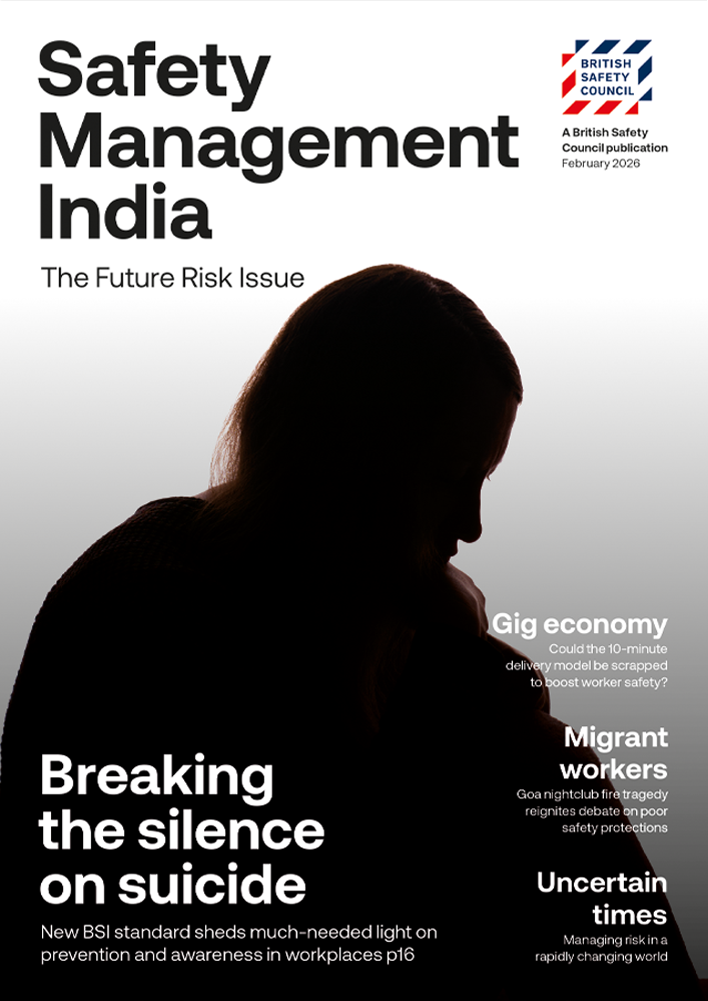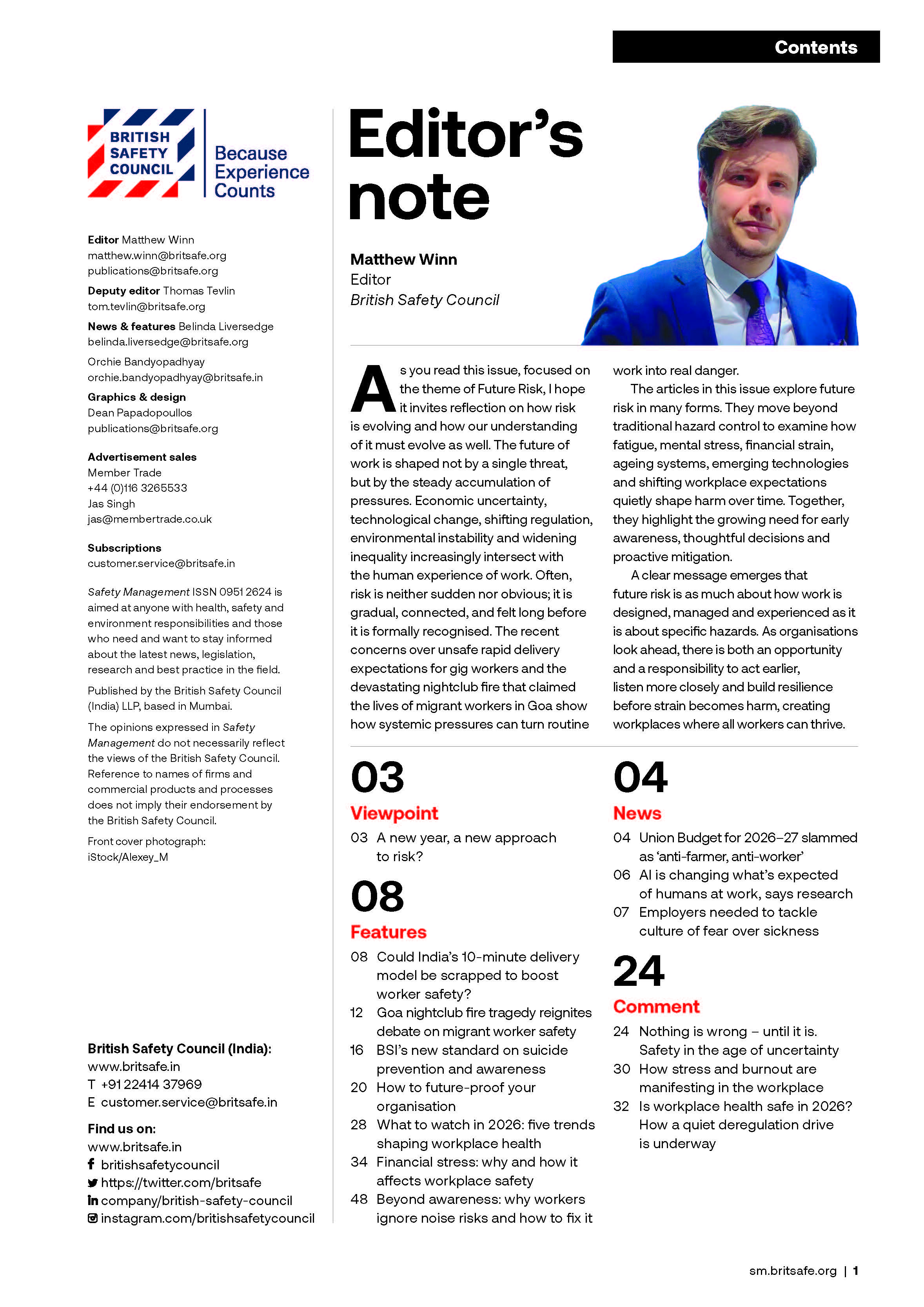Migrant workers in India face significant risks to their health and safety, but a new community-based training programme by British Safety Council and labour rights organisation Work Fair and Free seeks to educate them on how to protect themselves and their co-workers from accidents and illness at work.
Features
British Safety Council and Work Fair and Free join together to improve the health and safety of India’s migrant workers
In India, every year, millions of migrant workers move from their home villages to other rural areas or cities in search of work. However, this huge – and often overlooked – workforce is often employed informally in the unorganised sectors of the economy, paid poor wages and subject to precarious employment conditions, with little job security.
Migrant workers also frequently face disproportionate risks to their health and safety at work, placing them at higher risk of suffering occupational injuries and diseases compared to workers in the more tightly regulated organised sectors of the economy and those employed by formal businesses. This is due to factors such as the inherently hazardous nature of the work in sectors where migrants are often employed – such as construction and manufacturing – failures by employers to properly manage health and safety risks to migrants, and a lack of awareness of risks and precautions among the migrants themselves, in part due to limited access to safety training and suitable safety equipment.

British Safety Council (India) LLP believes that no one should be injured or made ill through their work, and, recognising the vulnerability of migrant workers to injury and ill health, in 2024 embarked on an occupational safety and health (OSH) training programme in partnership with labour rights research and knowledge organisation the Work Fair and Free Foundation (WFF), aimed at improving OSH awareness among migrant labour communities in India. The initiative forms part of British Safety Council’s charitable work aimed at achieving its vision of ensuring that every worker goes home at the end of the day as healthy as they were when they went to work.
The initiative aims to build a cadre of community-based trainers who go out into the field in urban and rural areas to educate migrant and informal workers about the OSH risks they face and how to protect themselves and their co-workers from work-related injury and ill health. OSH experts from the British Safety Council have provided Work Fair and Free with instruction, training and training materials to enable WFF to run ‘train-the-trainer’ sessions where community-based trainers, field mobilisers and worker leaders are equipped with the necessary knowledge, tools and methods to go into the community and deliver outreach OSH training to migrant and informal workers.
At the time of writing in June 2025, 28 community-based trainers from the states of Gujarat, Maharashtra and Rajasthan have received OSH training from WFF and Aajeevika Bureau, a workers’ rights organisation that seeks to protect the rights and wellbeing of migrant workers in India’s informal workforce, and conceived and established the Work Fair and Free Foundation. In turn, the community-based trainers have so far delivered OSH awareness training to more than 1,200 migrant and informal sector workers, through 16 training sessions held across Gujarat, Rajasthan, Maharashtra, and Karnataka.
Key messages
The training includes key messages on hazard identification, risk assessment, working at height, fire and electrical safety and first aid, and early results show significant increases in knowledge and behavioural shifts among workers and contractors alike, reports WFF.
Work Fair and Free is a research and knowledge institution that conducts a variety of programmes and initiatives aimed at creating an equitable and dignified world of work for labouring communities, including migrant labourers. WFF carries out independent research into the landscape of informal work and work conditions; offers policy and related advice to the central and state governments on how to ensure the dignity and wellbeing of informal, migrant communities; and supports industry leaders and employers to strengthen labour practices in their businesses and supply chains.
WFF also designs and delivers training for workers, employers, contractors and community leaders aimed at improving awareness and compliance with labour standards. WFF has also helped to establish worker facilitation centres in dense industrial areas of Gujarat and Maharashtra states, where migrant and vulnerable workers – including those working in sectors like construction, small manufacturing and processing, hotels and restaurants, transportation and agriculture – can obtain advice on securing their employment, occupational safety, education and social security rights.
WFF’s other initiatives include working with Social Compact, a multistakeholder movement that brings together corporates, worker organisations and experts to develop and implement solutions aimed at ensuring the equity and dignity of informal workers in India. It also implements programmes designed to enable migrants to access social security benefits, skills development, legal aid and education, in high-migration states, such as Maharashtra, Gujarat, Rajasthan, and Karnataka.
High-risk environments
Commenting on the training collaboration with British Safety Council, Divya Varma, co-founder and director of policy and practice at WFF, said: “Migrant workers are among the most vulnerable in the labour ecosystem, often working in high-risk environments with limited safeguards. Building awareness not only empowers them to demand safer conditions but also helps reduce injuries, illnesses and fatalities. It supports broader goals of productivity, employer responsibility and social justice.
“The participants at the WFF/British Safety Council training sessions include a diverse group of community-based trainers, field mobilisers and worker leaders. This inclusive approach ensures that knowledge does not remain limited to formal institutions but is embedded within the very communities it aims to protect.
“Trainers are now equipped not only with technical knowledge on OSH but also with the skills to facilitate peer learning, build local leadership and foster long-term change in workplace behaviour.”
Varma adds: “Future sessions will actively engage trade unions, worker associations and informal collectives. The goal is to create a distributed network of safety ambassadors who can take the lead in identifying local risks, advocating for better working conditions and sustaining a culture of prevention beyond the initial training cycle.
“By anchoring future sessions in collaboration with existing worker-led structures, the programme aims to embed safety practices into everyday workplace routines and expand the base of trained individuals who can advocate for themselves and their peers. The focus remains not only on awareness but on collective action, systemic change and long-term worker empowerment.”
Varma adds that the training is designed to enable migrant workers to overcome a variety of systemic barriers that prevent them from safeguarding themselves and their colleagues effectively.
“A major obstacle to migrants keeping themselves safe at work is the lack of adequate training and awareness,” she says. “Most migrant workers begin employment without any formal instruction on workplace safety. Safety is often reduced to a set of verbal instructions, with little emphasis on helping workers understand underlying risks or develop prevention strategies. This absence of foundational knowledge leaves workers unprepared to identify hazards or respond appropriately in emergencies.
“Language and literacy barriers further compound the problem. Migrant workers come from diverse regions of India and may not be fluent in the local language of the state or the language used at the workplace. Written instructions, signage and training materials are often inaccessible due to low literacy levels or unfamiliar languages, making crucial safety communication ineffective. As a result, workers may unknowingly engage in unsafe practices or be unaware of available protections.”
“Also, legal protections and regulatory oversight are weak in many sectors employing migrant labour. Most of these workers operate in informal or unregistered settings, where compliance with labour laws is minimal and workplace inspections are rare. Even when laws exist on paper, enforcement is often inconsistent, and workers are typically unaware of their rights or unsure of how to report violations.”
Migrant workers also frequently lack access to suitable safety equipment, such as personal protective equipment, and are often reluctant raise concerns about unsafe working conditions due to a fear of losing their jobs, having their wages withheld, or being blacklisted by contractor.
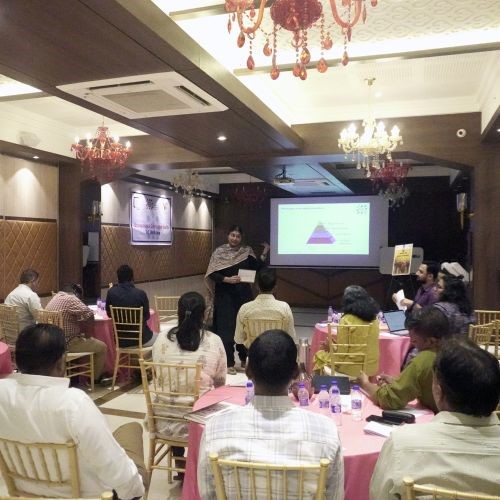
Disconnected from their communities
“Migrant workers, often living far from home, may feel disconnected from their communities and excluded from workplace decision-making,” explains Nisarg Joshi, associate – social compact at WFF. “Language and cultural differences can further alienate them from peers and supervisors, limiting their participation in safety committees or collective bargaining platforms. Without a voice in safety planning, their unique risks and concerns remain unaddressed.”
However, Varma believes the WFF/British Safety Council training sessions will empower a substantial number of migrant workers with the skills, knowledge and confidence to take an active role in protecting themselves and their colleagues.
“When workers are informed about potential hazards and their rights, they are more likely to identify and report unsafe conditions, which in turn helps prevent accidents and occupational illnesses,” she argues.
“Awareness not only improves individual safety but also contributes to building a culture of safety that benefits both workers and employers. It encourages peer-to-peer learning, where workers support and educate one another, reinforcing safe practices through collective action.
“For migrant workers who often face additional challenges – such as language barriers, lack of formal training, and limited legal protections – such awareness is both protective and empowering. It enables them to make informed decisions, assert their rights, and contribute more confidently to a safer and healthier workplace environment.”
Technical expertise
Varma adds that Work Fair and Free was happy to work with British Safety Council as the two organisations have a shared goal of ensuring that workers in all sectors of the Indian economy, including migrant and vulnerable workers, are not injured or made ill through their work.
“British Safety Council brings deep technical expertise and global experience in OSH, while WFF offers grounded knowledge of the informal sector and migration,” she explains. “The partnership is rooted in mutual recognition that transformative change in worker safety requires both community engagement and institutional capacity-building.
"This partnership allows us to localise best practices and scale community-led training models going forward. Together, we aim to make safety education accessible and relevant for the most vulnerable worker populations.”
The training sessions for the community outreach workers, who go out into the field to train migrant workers on OSH risks and precautions, were jointly developed by British Safety Council and Work Fair and Free. The community trainers are given technical OSH content, facilitation skills and visual tools such as posters and checklists.
The training delivered by the community trainers to migrant workers is highly interactive and tailored to the real-life working environments of migrant and unorganised workers, which helps make the content relevant and relatable. The trainers use hands-on experiences and demonstrations to engage workers and make the sessions participatory and practical.
Once the community trainers have received their initial training, WFF provides ongoing support and mentorship through regular check-ins and refresher sessions to ensure they are delivering the training in the most effective way. The idea is to enable the community trainers to address challenges and improve their delivery of the training to migrants out in the field. WFF also actively monitors the training sessions that are delivered to migrants through field observations and collects feedback from both trainers and participants, creating a continuous improvement loop.
Fall through the cracks
Commenting on the reasons why British Safety Council decided to develop the training programme with WFF, Hemant Sethi, managing director of British Safety Council (India) LLP, said: “We started this project with Work Fair and Free because internal migrant workers in India often fall through the cracks when it comes to safety training and protection. They’re a vital part of the workforce, yet many of them face serious risks on the job.
“As a charity, British Safety Council exists to make a difference where it matters most – by protecting lives and improving health and safety for people in all types of work, especially those in high-risk or underserved communities.
“By partnering with Work Fair and Free, who have deep ties to these communities, we hope to empower workers with the knowledge and tools they need to stay safe. Our goal is simple but ambitious: to help build a culture of safety that includes everyone, especially those who’ve historically been overlooked.”
Sethi firmly believes the partnership with Work Fair and Free will make a difference when it comes to improving the working conditions, labour rights and general welfare of migrant workers in India. “With this partnership, we’re training local community members because they understand the language, culture and challenges of migrant workers. These are trainers who go out into the field for the delivery of training. They’re helping workers understand their rights, identify hazards and even advise employers on how to improve safety on-site.
“That kind of grassroots engagement creates real, lasting change because it comes from within the community.”
Visual training materials
Sethi adds that British Safety Council sought from the outset to develop training modules and materials that would be easy to deliver out in the field where technology, such as projector screens to deliver computer-based presentations, might not always be available or even be the most effective training method for the specific audience. “One of the more prominent aspects of this collaboration is that it can be so practical with hands-on work,” he explains. “We’ve developed visual training materials – cue cards along with posters. They do not rely on any fancy equipment. So, it is possible to get the message across effectively, even at job sites where screens or projectors are not available.”
Both British Safety Council and Work Fair and Free say early results from monitoring of the effectiveness of the training delivered to migrants in the field reveals a significant increase in OSH knowledge and a behavioural shift towards safer OSH practices among both workers and contractors attending the training.
“It is still in the early days, but we have now heard some encouraging feedback,” says Sethi. “That feedback comes from within the field. Trainers have reported that workers are starting to speak up more with questions about safety, looking out for one another and feeling more confident about standing up for their wellbeing. Small behavioural shifts often cause big changes throughout time.”
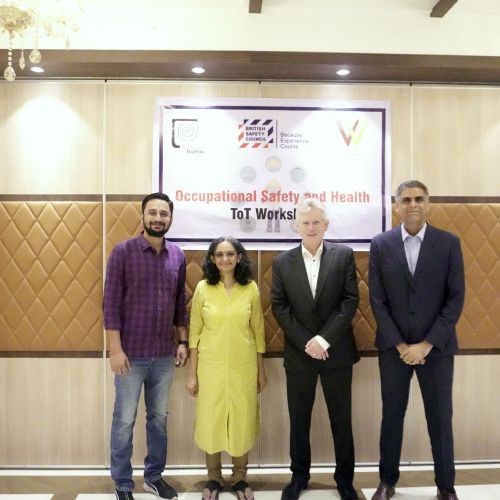
Positive feedback
Also, the feedback to date from both the community trainers and the migrant workers has been overwhelmingly positive.
One of the community trainers said: “During the British Safety Council training sessions, we learned about key occupational health and safety concepts, including hazard identification, risk assessment, emergency response, the proper use of personal protective equipment and the rights of workers under Indian labour laws. The training was highly practical and adapted to the real-life conditions migrant workers face in informal sectors.
“The training has been incredibly helpful not just in building our own understanding, but in giving us the tools and confidence to educate others. The use of interactive techniques, such as visual aids and real-life scenarios made it easier to retain and communicate information effectively in the field.”
The trainers have also been able to successfully transfer the OSH knowledge gained in the British Safety Council training to migrant workers in the field.
The community trainer adds: “The training equipped us not only with essential technical knowledge on common workplace hazards – such as improper use of personal protective equipment, fire and electrical safety – but also with participatory teaching methods that are better suited to informal work settings.
“For instance, in Ahmedabad, during a safety session with workers from a construction site, one of the trainers used visual flashcards from the toolkit to explain the dangers of working at heights without proper harnesses. Many workers said they had never received any formal safety briefing before. Following the session, one worker spoke to the contractor and requested a demonstration on safe scaffolding practices – something that hadn't happened before.”
The migrant workers have also reported transformative impacts following the training.
A 43-year-old construction worker from Navi Mumbai said that while working at multiple building sites, he had been provided with basic safety instructions by his employers but had never been given formal training on how to identify hazards and assess risks. “Through this training, we are now better equipped to use safety equipment effectively and prioritise the overall safety of all workers,” he stated.
“Long working hours and pressure to complete tasks on time often result in safety oversights, putting workers at greater risk of accidents and injuries,” he added. “The safety modules covered in this training are critical for ensuring that best practices are consistently followed, and even the smallest risks are identified and addressed immediately.”
Meanwhile, a 32-year-old factory worker from Ahmedabad said that after receiving the training, his entire perspective on occupational safety has changed drastically. “Earlier, I believed that injuries were the only possible risks on the shop floor. But now, I pay much closer attention to other workplace hazards such as noise levels, machine handling, and ergonomics.
“The training modules, with their simple visuals and clear information, have made it easier for us to understand occupational risks. I also realised that occupational safety is not just about wearing personal protective equipment, but also about being aware of potential risks and taking preventive measures to avoid accidents.”
Signs of progress
Looking ahead, Varma says that, although there is still much work to be done to improve occupational health and safety for migrant workers in India, there are signs of progress. “Challenges persist in the form of weak enforcement, employer apathy and a fragmented policy landscape,” she says.
“Achieving systemic change will require stronger enforcement of existing laws by both central and state governments, alongside mandatory accountability for employers, particularly those employing through contractors for large-scale projects. Robust data systems and accessible grievance redress mechanisms must be established to track risks and ensure timely interventions.
“Additionally, there is a critical need for greater investment in training and preventive healthcare to foster a culture of safety at the grassroots level.”
Varma adds: “NGOs, trade unions and community-based organisations have a vital role to play in sustaining public pressure, driving innovation and ensuring that worker safety remains a shared priority. The community training partnership between Aajeevika Bureau, Work Fair and Free and British Safety Council exemplifies how such multi-stakeholder efforts can meaningfully contribute to creating safer and more dignified workplaces for those who need it most.”
WFF adds that ensuring the safety of migrant workers in India will require far more work than simply distributing safety equipment or posting warning signs. It says a structural shift is required to embed health and safety into training, communication, legal frameworks and workplace culture.
“By breaking down these barriers, we move closer to a future where every worker, regardless of background or employment status, has the knowledge, tools, and support to work with dignity and return home safely,” adds Varma.
Social justice
Sethi adds: “British Safety Council believes the outlook for occupational health and safety in India is improving, but the work is far from done. That’s why our charitable work in India continues. For us, this is about social justice as much as it is about safety – helping ensure that those who are most exposed to risk are not left out of the conversation or the solutions.
“I believe that the future is quite hopeful but only if we continue investing in solutions that are driven by education, partnerships and community. Migrant workers’ issues, though complex, are surmountable. We can assist in a shift of the tide with a focus from our organisations, together with strong partners operating on the ground.”
Sethi believes that a safety-first mindset must be created among workers, employers and policymakers. “I do think we’ll see progress, especially after more people understand the importance of good occupational safety and health. Everyone involved should realise that good safety isn’t a luxury – it’s a fundamental right.”
British Safety Council says it views the community-based training partnership with WFF as a long-term commitment designed to improve the health and safety of migrant workers in India.
“We see this as a long-term commitment,” explains Sethi. “Changing attitudes and behaviours doesn’t happen overnight, and we’re in this for the long haul. While we are developing our impact metrics, the ambition is clear: we want to train as many community trainers as possible and reach thousands of migrant workers through them.
“Every trainer we support becomes a multiplier – someone who can go out and make a tangible difference in their community. So, the more trainers we equip, the greater the impact we can have.”
For more information see:
britsafe.in
workfairandfree.org
FEATURES

Turning sustainability compliance into business opportunity
By on 27 February 2026
Businesses that publicly demonstrate good sustainability performance can reap financial, reputational and other benefits, but it’s important to minimise the cost of any reporting on sustainability issues and to focus efforts on improving aspects of sustainability where the benefits outweigh the costs.
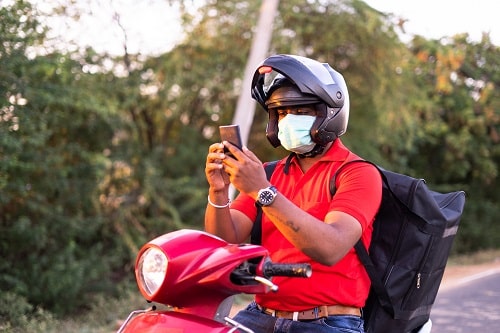
India’s 10-minute delivery model: why working conditions could be about to improve
By Orchie Bandyopadhyay on 13 February 2026
India’s ‘10-minute’ quick-commerce home delivery model has been criticised for allegedly encouraging reckless riding by delivery workers, but the Government has now reportedly stepped in to urge the app platforms to abandon the time-bound delivery promise and do more to ensure the safety of the sector’s workers.
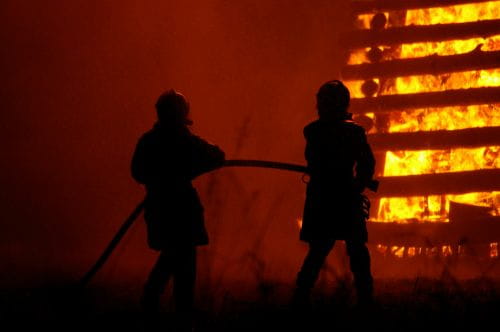
Migrant workers: Goa fire tragedy reignites debate on poor safety protections
By Orchie Bandyopadhyay on 13 February 2026
A deadly fire at a nightclub in Goa that claimed the lives of 20 migrant workers from across India made global headlines – and triggered fresh demands for government agencies to step up efforts to ensure the safety of low-paid workers in environments such as bars, nightclubs and hotels.


